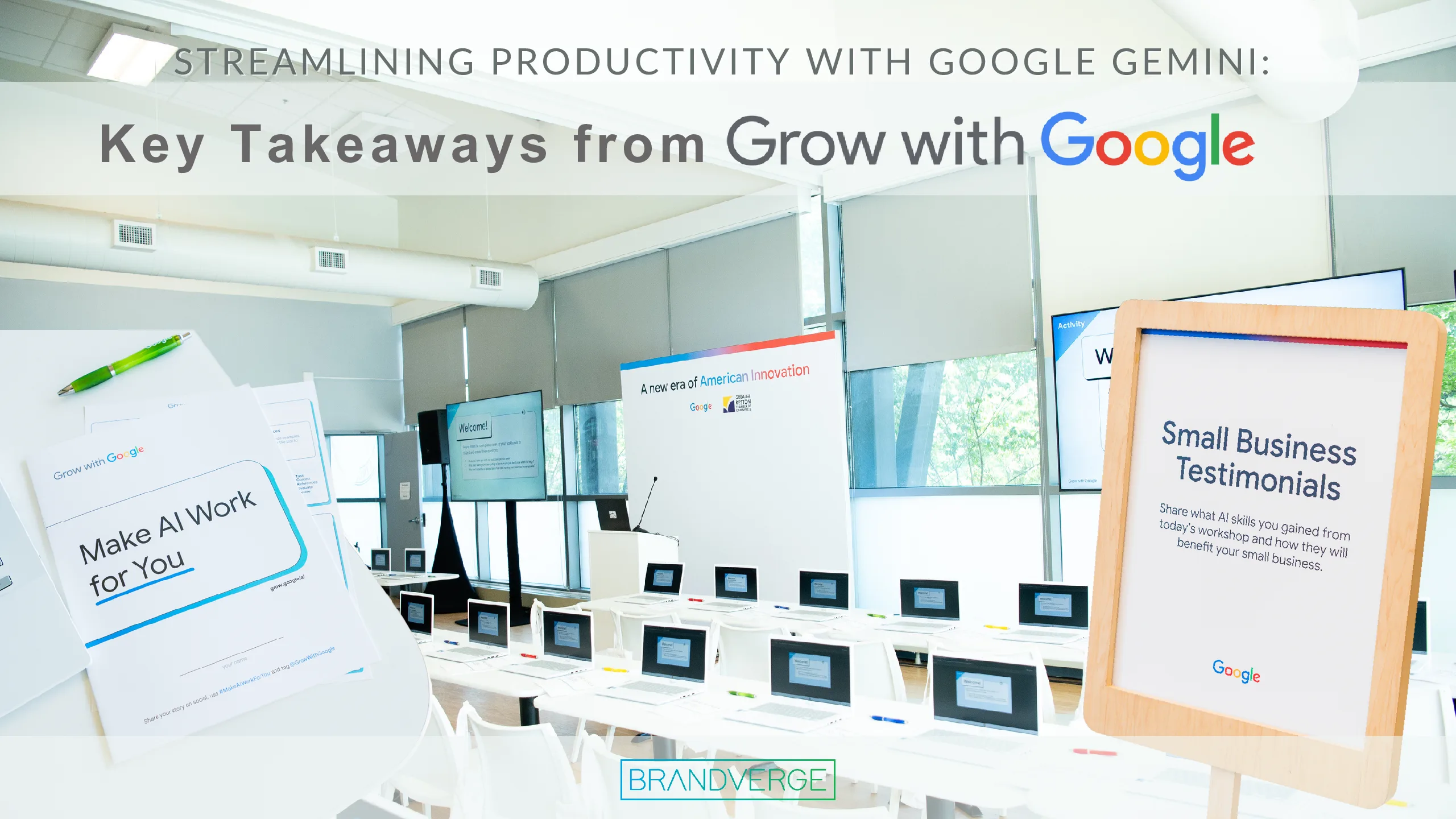Our intern recently attended the Grow with Google conference. This event offered a deep dive into leveraging Google Gemini, an AI-powered assistant, to enhance productivity and streamline workflows. From crafting effective prompts to brainstorming solutions and building a reusable prompt library, attendees learned practical strategies to make AI work smarter for their businesses. Below are five key insights from the conference, designed to help you integrate Gemini into your daily operations and boost efficiency.
Harnessing the Power of Gemini for Task Delegation
Understanding Prompting
Prompting is the cornerstone of using Google Gemini effectively. It involves providing clear, specific instructions to the AI to achieve desired outcomes. Whether you’re delegating a task like drafting emails or generating marketing content, a well-crafted prompt ensures Gemini delivers accurate and useful results. The process combines precision with creativity, requiring you to define the task, persona, format, context, and references.
Crafting Effective Prompts
To delegate tasks effectively, use a structured prompt format: specify the task, assign a persona (e.g., “email marketer”), define the output format (e.g., “500-word email with bullet points”), provide context (e.g., “I run a floral design business”), and include references for style. For example, to write an introductory email for a new business, you might prompt Gemini: “Help me write an introductory email to local businesses about my floral design business, aiming for partnerships. You’re an email marketer. The output should be 500 words max, friendly, with bullet points. I source flowers locally and offer bespoke pricing.” Iterating on prompts by adding context or constraints can refine results, making Gemini a powerful tool for automating repetitive tasks.
Brainstorming Solutions with Prompt Chaining
What is Prompt Chaining?
Prompt chaining is a dynamic technique where each prompt builds on the previous one, creating a conversational flow that refines ideas. This method is ideal for tackling tasks you’ve been postponing due to uncertainty about where to start. By breaking down complex challenges into smaller, manageable prompts, Gemini can guide you from ideation to actionable plans.
Applying Prompt Chaining
Start by selecting a task, such as planning a marketing campaign, and ask Gemini for three initial ideas. For instance: “I need to plan a marketing campaign for my bakery but don’t know where to start. Act as a marketing strategist and give me three ideas. My bakery specializes in vegan pastries.” Use the output to craft a second prompt, like asking for three approaches to implement one idea, and a third for a detailed plan. This iterative process helps uncover novel solutions and provides clarity, making Gemini an invaluable brainstorming partner.
Tackling Work Challenges with AI Assistance
Identifying and Describing Challenges
Gemini can transform how you address workplace challenges, from tedious tasks to complex decision-making. Begin by identifying a challenge, such as organizing a budget-friendly team event, and describe it clearly. Consider how AI can assist—perhaps by brainstorming options or creating timelines—and select Gemini as your tool for its integration with Google Workspace apps like Docs and Sheets.
Implementing AI Solutions
Write a prompt to address the challenge, such as: “Plan a budget-friendly team picnic for 20 people. Act as an event planner, providing location ideas, activities, and a vegan-friendly menu within a $500 budget.” Review the output, iterate for specificity (e.g., “locations within 15 minutes of the office”), and use Gemini to generate a timeline or assign tasks in Google Sheets. Save successful prompts to a library for future use, ensuring you can quickly revisit effective strategies.
Building a Prompt Library for Efficiency
Why Create a Prompt Library?
A prompt library is a collection of your most effective prompts, allowing you to reuse and refine them for recurring tasks. This saves time and ensures consistency, whether you’re generating marketing content, scheduling social media posts, or responding to customer inquiries.
Examples of Reusable Prompts
For example, try: “Act as a content marketer for my tech startup. Create a 300-word blog post to increase website traffic by 10%. The audience is tech enthusiasts, and the tone is professional.” For customer service: “Act as a customer service specialist for my retail store. Respond to a customer asking about our refund policy in a concise, empathetic tone.” Storing these in a prompt library streamlines workflows and makes AI assistance a seamless part of your process.
Exploring Advanced Use Cases for Gemini
Generating Content and Insights
Gemini’s multimodal capabilities extend beyond simple tasks. It can create marketing materials, analyze reports, or design visual assets. For example, prompt Gemini to “analyze a sales report for my retail business, identifying three trends and actionable recommendations.” Or use it to generate product descriptions from photos, tailoring them to specific audiences with a prompt like: “Describe this handbag for young professionals, emphasizing affordability and style.”
Scaling Your Business
Gemini can also support strategic growth. For a product launch, prompt: “Act as a business consultant for my eco-friendly clothing line. Create a launch plan with pre-launch buzz, launch-day promotions, and post-launch feedback strategies within a $2,000 budget.” By integrating Gemini with Google Workspace tools like Google Drive and Google Meet, you can automate repetitive tasks, sync plans across teams, and unlock new opportunities for efficiency.
Conclusion
The Grow with Google conference highlighted Google Gemini’s potential to transform workflows and boost productivity. By mastering prompting, leveraging prompt chaining, and building a prompt library, you can make AI work smarter for you. With Gemini in Google Workspace, you’re equipped to streamline tasks, brainstorm creatively, and scale your business effectively.


Leave a Reply